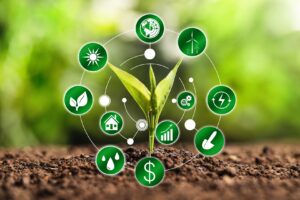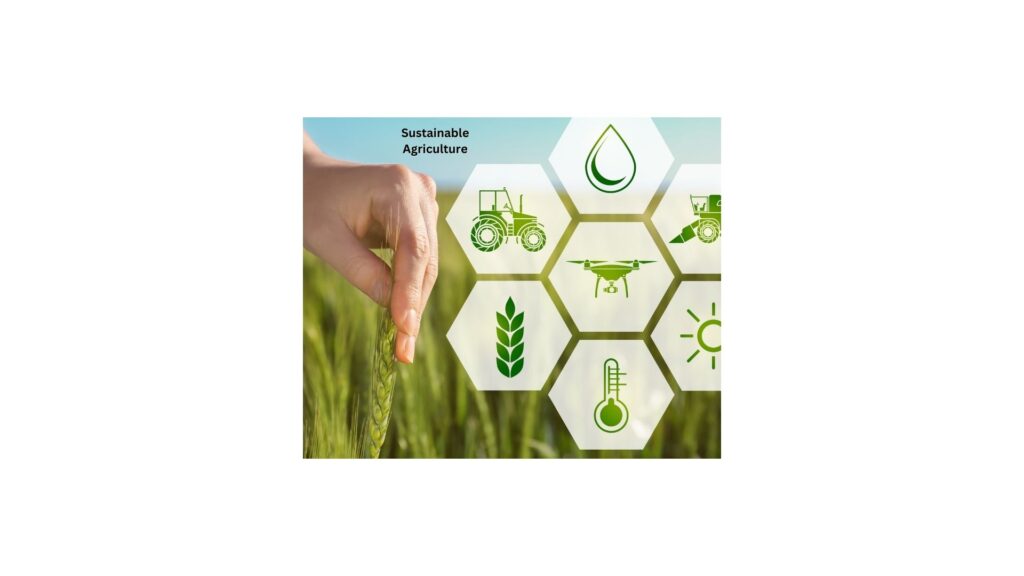Sustainable Agriculture: A Solution to the Climate Crisis
The climate crisis is one of the main issues facing humanity today. Its effects are being felt worldwide, from rising sea levels to extreme weather events, to food and water insecurity. One sector that has a significant role to play in addressing the climate crisis is agriculture. The way we produce food and manage our land has a significant impact on greenhouse gas emissions and the health of our environment. However, agriculture also has the potential to be a solution to the climate crisis, through the adoption of sustainable practices that can reduce emissions, increase carbon sequestration, and promote biodiversity.
In this blog, we will explore the importance of sustainable agriculture as a solution to the climate crisis. We will begin by examining how conventional agricultural practices contribute to climate change and other environmental problems. We will then explore how sustainable agriculture practices, such as regenerative agriculture and agroforestry, can mitigate climate change and improve the health of our ecosystems. We will also discuss the economic benefits of promoting sustainable agriculture and the policy solutions that can support the transition to more sustainable agricultural practices.
Through this exploration, we hope to show that sustainable agriculture is not only an essential strategy for mitigating climate change but also a way to build a more resilient and equitable food system. We can work towards a more sustainable and just future for all by prioritizing sustainable agriculture.
Sustainable Agriculture And Its Differences From Conventional Agriculture

Sustainable agriculture is an approach to food production that prioritizes environmental health, social equity, and economic profitability. It aims to promote sustainable land use practices that minimize environmental impacts, conserve natural resources, and support local communities. Sustainable agriculture differs from conventional agriculture in several ways, such as:
-
Soil Health:
Sustainable agriculture prioritizes maintaining and improving soil health through practices such as cover cropping, crop rotation, and reduced tillage, while conventional agriculture often relies on chemical fertilizers and pesticides that can harm soil health.
-
Biodiversity:
Sustainable agriculture promotes crop diversity and the use of companion planting to reduce pests and diseases, while conventional agriculture often relies on monoculture, which can reduce biodiversity and lead to soil depletion.
-
Water Management:
Sustainable agriculture aims to conserve water resources through practices such as rainwater harvesting and drip irrigation, while conventional agriculture often relies on inefficient irrigation methods that wastewater.
-
Energy Use:
Sustainable agriculture aims to reduce energy use by promoting on-farm energy generation, such as solar and wind power, and reducing the use of fossil fuels, while conventional agriculture often relies heavily on fossil fuels for energy.
-
Social Equity:
Sustainable agriculture promotes fair labor practices and community involvement, while conventional agriculture often relies on exploitative labor practices and disempowers local communities.
Examples of sustainable agriculture that have been implemented successfully
Many successful sustainable agriculture practices have been implemented around the world, such as:
-
Regenerative Agriculture:
This approach involves building healthy soils, increasing biodiversity, and improving ecosystem services. Regenerative agriculture practices such as cover cropping, crop rotation, and composting have been implemented by farmers around the world to increase soil carbon sequestration and reduce greenhouse gas emissions.
-
Agroecology:
Agroecology is a science-based approach to sustainable agriculture that prioritizes the integration of ecological principles into farming practices. Agroecology practices such as intercropping and companion planting have been implemented in various regions of the world to increase biodiversity and reduce pest and disease pressures.
-
Organic Farming:
Organic farming practices avoid the use of synthetic fertilizers and pesticides and instead rely on natural inputs such as compost and cover crops. Organic farming has been shown to reduce greenhouse gas emissions and increase carbon sequestration while improving soil health and biodiversity.
-
Conservation agriculture:
Conservation agriculture practices, such as no-till farming, have been implemented in many regions of the world to reduce soil erosion and improve soil health. These practices have been shown to increase carbon sequestration and reduce greenhouse gas emissions.
Promoting these and other sustainable agriculture practices can help mitigate climate change and build a more resilient and sustainable food system.
Farm Practices and Climate Change: Understanding Agriculture’s Impact
Agriculture plays a crucial role in contributing to climate change. The production of livestock and their feed is a significant source of greenhouse gas emissions, mainly methane and nitrous oxide. In addition, the use of synthetic fertilizers in conventional agriculture contributes to nitrous oxide emissions, which are over 300 times more potent than carbon dioxide in terms of their warming potential.
Land-use changes such as deforestation for crop production and livestock grazing also release carbon into the atmosphere. Furthermore, the use of fossil fuels in agriculture, such as in farm machinery and transportation, also contributes to greenhouse gas emissions. Overall, agriculture accounts for up to 24% of global greenhouse gas emissions, making it an essential sector to address in efforts to mitigate climate change. Sustainable agriculture practices can significantly reduce greenhouse gas emissions and promote more climate-friendly food production systems.
Climate Change Mitigation: The Crucial Role of Agriculture
Agriculture is a significant contributor to greenhouse gas emissions, accounting for roughly 10-12% of total global emissions. However, sustainable agriculture practices can play a crucial role in mitigating climate change. By adopting practices such as agroforestry, conservation tillage, and crop rotation, farmers can reduce their reliance on synthetic fertilizers and pesticides, decrease soil erosion, and promote carbon sequestration.
Additionally, transitioning to regenerative agriculture can reduce greenhouse gas emissions by improving soil health, increasing crop yields, and supporting biodiversity. Overall, sustainable agriculture represents a critical pathway toward building a more sustainable and resilient food system that benefits both people and the planet.
In addition to reducing emissions, agriculture can also play a crucial role in adapting to the impacts of climate change. As climate change exacerbates extreme weather events such as droughts, floods, and heat waves, farmers must adopt strategies to increase the resilience of their crops and protect their livelihoods.
For example, sustainable agriculture practices such as intercropping and diversifying crops can help farmers maintain yields in the face of changing climate conditions. Similarly, the use of drought-resistant crop varieties, water management strategies, and other adaptive measures can help farmers adapt to the changing climate and build resilience in the face of future uncertainties. Thus, sustainable agriculture represents a critical strategy for both mitigating and adapting to the impacts of climate change in the agricultural sector.
Conclusion
In conclusion, sustainable agriculture offers a practical and effective solution to the climate crisis by mitigating greenhouse gas emissions, promoting soil health, and preserving biodiversity. By adopting sustainable farming practices such as crop rotation, conservation tillage, and agroforestry, farmers can reduce their reliance on synthetic fertilizers and pesticides and improve the resilience of their crops to extreme weather events. This, in turn, can lead to increased productivity, profitability, and food security.
Furthermore, sustainable agriculture can provide a means for mitigating climate change while also addressing broader social and environmental challenges, such as reducing poverty, improving public health, and protecting natural resources. Ultimately, sustainable agriculture represents a critical pathway toward building a more sustainable and resilient food system that benefits both people and the planet.

